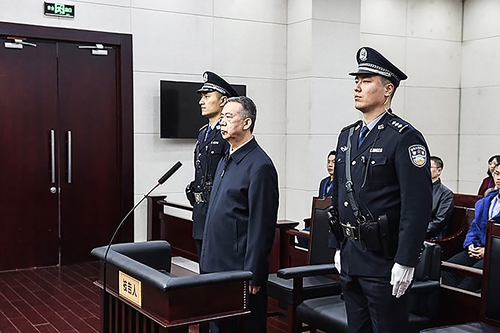HOME >> CHINA
Former Interpol head sentenced to imprisonment for accepting bribery
By Yang Sheng Source:Global Times Published: 2020/1/21 21:08:41

This handout photo released by Tianjin First Intermediate People's Court shows former Interpol chief Meng Hongwei (center) during sentencing. Meng, who was detained in 2018, was sentenced to more than 13 years in prison for accepting bribes, according to a court statement. Photo: AFP
The former Chinese public security vice minister and former Interpol chief Meng Hongwei, detained in 2018, has been sentenced to 13 years and six months in prison for accepting bribes.
Foreign media was trying to indicate the case was driven by political reasons, but Chinese experts noted that no matter how many facts China released, the politically biased foreign media stuck to "conspiracy theories" rather than neutrally reporting the case.
The First Intermediate People's Court of Tianjin pronounced in a statement that Meng had confessed to all the criminal charges and would not appeal, China Central Television (CCTV) reported on Tuesday. Meng was also fined 2 million yuan ($289,900).
Meng was elected president of Interpol, based in Lyon, France, in 2016, becoming the first Chinese official to take the post.
Meng, also former head of China Coast Guard, pleaded guilty on June 20 to accepting 14.46 million yuan in bribes from 2005 to 2017 in an open trial in Tianjin, the People's Daily reported.
Meng was expelled from the Communist Party of China (CPC) and dismissed from public office for serious violations of Party discipline and laws, China's top anti-graft body, the CPC Central Commission for Discipline Inspection and the National Supervisory Commission, said in a statement on March 27, the Xinhua News Agency reported.
Meng's wife was granted political asylum by France in 2019 after she claimed that she feared for herself and her two children as potential targets of kidnapping attempts.
When foreign media report about Chinese officials, they will suggest the officials are corrupt in general, Shen Yi, a professor at Shanghai-based Fudan University, told the Global Times on Tuesday.
When China launches an anti-corruption campaign, Western media changed their angle and began to question so-called political motives.
"It's not something that we can change by releasing more details and facts about the case," Shen said, "because neutrality is not their priority while reporting on China."
It was obvious Meng's wife was trying to hype the case by telling stories to those media outlets that have a strong anti-China political stance, such as Radio France Internationale, experts said.
She benefited from bribery and in the meantime could stay in France to avoid investigation, they concluded.
Posted in: POLITICS,CHINA FOCUS